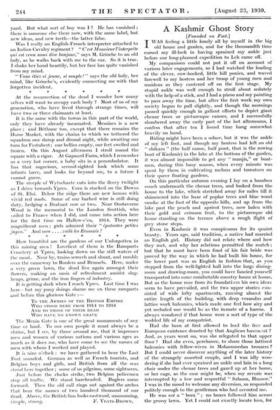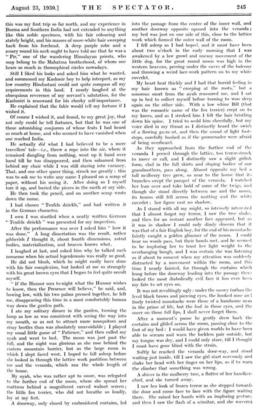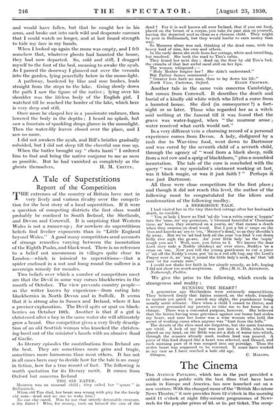A Kashmir Ghost Story
[Founded on Fact.]
ISFAS feeling a little lonely all by myself in. the big old house and garden, and for the thousandth time cursed my ill-luck in having sprained my ankle just before our long-planned expedition to Leh came off.
My companions could not put it off on account of
various later engagements, so I had watched the loading of the clever, cow-hocked, little hill ponies, and waved farewell to my hostess and her troop of young men and maidens as they cantered off. on the first stage. My stupid ankle was well enough to stroll about sedately with the help of a stick, and I had a piano. and my painting to pass away the time, but after the first week, my own society began to pall slightly, and though the. mornings passed quickly enough in gallant efforts to depict, giant chenar trees or picturesque canoes, and I successfully slumbered away the early part of the hot afternoons, I confess that after tea I found time hang somewhat heavily on hand.
Riding might have been a solace, but it was the ankle
of my left foot, and though my hostess had left an old " shikara " (the half canoe, half punt, that is the rowing boat of Kashmir) in the lake at the bottom of the garden, it was almost impossible to get any " manjis," or boat- men, during this busy season, when every minute was spent by them in cultivating melons and tomatoes on their queer floating gardens.
On this particular autumn evening I lay on a bamboo couch underneath the chenar trees, and looked from the house to the lake, which stretched away for miles till it shimmered into the haze of poplar trees and blue wood smoke at the foot of the opposite hills, and up from the lake past the peach and apricot trees, now laden with their gold and crimson fruit, to the picturesque old house standing on the terrace above a rough flight of grey stone steps.
Even in Kashmir it was conspicuous for its quaint
beauty. Years ago, said tradition, a native had married an English girl. History did not relate where and how they met, and why her relations permitted the match ; but that he must have been fond of his fair bride was proved by the way in which he had built his house, for the lower part was so English in fashion that, as you stepped from the well-lighted hall into the large dining- room and drawing-room, you could have fancied yourself transported into some comfortable country house at home. But as the house rose from its foundations his own ideas seem to have prevailed, and the two upper stories con- sisted of wide lofty apartments, running almost the entire length of the building, with deep verandas and lattice work balconies, which made one feel how airy and yet secluded one would be as the inmate of a harem. I always wondered if that house were a sort of type of the wedded life of my compatriot.
Had she been at first allowed- to lead the free and European existence denoted by that Anglican basement ?
And, as years went on, was she relegated to that upper floor ? Had she even, perchance, to share those latticed balconies with fellow-wives in Mohammedan trousers ? But I could never discover anything of the later history of the strangely assorted couple, and I was idly won- dering if she had ever sprained an ankle and lain in a long chair under the chenar trees and gazed up at her home, or her cage, as the case might be, when my reverie was interrupted by a low and respectful " Salaam, Huzoor." I was in the mood to welcome any diversion, so responded politely enough to the gentleman who had accosted me.- - He was not a " bora" ; no boxes followed him across the grassy lawn. Yet-I could not exactly locate WM, for
this was my first trip so far north, and my experience in Burma and Southern India had not extended to anything like this noble specimen, with his fair colouring and stately height, and his masses of snow-white hair sweeping back from his forehead. A deep purple robe and a rosary round his neck ought to have told me that he was a " Pir," one of the wandering Himalayan priests, who may belong to the Mahatma brotherhood, of whom one hears so much in theosophical circles nowadays.
• Still I liked his looks and asked him what he wanted, and summoned my Kashmir boy to help interpret, as my low country Hindustani could not quite compass all my requirements in this land: I nearly laughed at the obsequious reverence of my servant's salutation, for the Kashmiri is renowned for his cheeky self-importance.
He explained that the fakir would tell my fortune if I wished it.
Of course I wished it, and found, to my great joy, that not only could he tell fortunes, but that he was one of those astonishing conjurors of whose feats I had heard so much at home, and who seemed to have vanished when one reached India.
He actually did what I had believed to be a mere travellers' tale—i.e., threw a rope into the air, where it remained dangling from nothing, went up it hand over hand till he too disappeared, and then salaamed from behind my chair while I was still staring into vacancy. That, and one other queer thing, struck me greatly : this was to ask me to write any name I pleased on a scrap of paper, without his seeing it. After doing so I myself tore it up, and buried the pieces in the earth at my side.
He then took the pencil, and on another scrap wrote down the name.
I had chosen " Teufels drockh," and had written it in the German character.
I own I was startled when a neatly written German " TeufeLs drockh " was presented for my inspection.
After the performance was over I asked him " how it was done." A long dissertation was the result, rather gibberish I thought it, about fourth dimensions, astral bodies, materialization, and heaven knows what.
I laughed at last, and asked him why he talked such nonsense when his actual legerdemain was really so good.
He did not blush, which he might easily have done with his fair complexion, but looked at me so strangely with his great brown eyes that I began to feel quite occult myself.
" If the Huzoor sees to-night what the Huzoor wishes to know, then the Presence will believe," he said, and, bowing low, with his two palms pressed together, he left me, disappearing this time in a most comfortably human way down the garden path.
I ate my solitary dinner in the garden, turning the lamp as low as was consistent with seeing the way into my mouth, so as not to attract more mosquitoes and stray beetles than was absolutely unavoidable ; I played my usual -little game of " Patience," and then called my ayah and went to bed. The moon was just past the full, and the night was glorious as she rose behind the eastern mountain barrier, but as the large room in which I slept faced west, I hoped to fall asleep before she looked in through the lattice work partition between me and the veranda, which ran - the whole length of the house.
My ayah, who was rather apt to snore, was relegated to the further end of the room, where she spread her mattress behind a magnificent carved walnut screen ; the little fox terrier, who did not breathe so loudly, lay at my feet.
A doorway, -only closed by- embroidered curtains, led into the passage from tho centre of the inner wall, and another doorway opposite opened into the veranda ; my bed was just on one side of this, close to the lattice work which formed the outer wall of the room.
I fell asleep as I had hoped, and it must have been about two o'clock in the early morning that I was
awakened by a low growl and uneasy movement of the little dog, for the great round moon was high in the western heavens, peering under the eaves of the balcony and throwing a weird lace-work pattern on to my white coverlet.
My heart beat thickly and I had that horrid feeling in my hair known as " creeping at the roots," but a sonorous snort from the ayah reassured me, and I sat up in bed to collect myself before turning to woo sleep again on the other side. With a low whine Bill (that
was the romantic name of the fox terrier) crept On to
my knees, and as I stroked him I felt the hair bristling down his spine. I tried to scold him cheerfully, but my voice died in my throat as I distinctly heard the swish of a flowing giu m Nit, and then the sound of light foot- steps, carefully hushed as if the promenader were afraid of being overheard.
As they approached from the further end of the veranda I peered through the lattice, too terror-struck to move or call, and I distinctly saw a slight girlish form, clad in the full skirts and sloping bodice of our grandmothers, pass along. Almost opposite my bed a tall mulberry tree grew, so near to the house that it; branches swept the parapet of the veranda. I watched her lean over and take hold of some of the twigs, and though she stood directly between me and the moon, its beams still fell across the matting and the white coverlet ; her figure cast no shadow.
As I stared with all my might, so intensely interested that I almost forgot my terror, I saw the tree shake, and then for an instant another face appeared, but as
it was in shadow I could only dimly discern that it was that of a fair English boy, for the end of his moustache
faintly caught a golden glimmer of the moon. I could hear no words pass, but their hands met, and he seemed to be imploring her to trust her light weight to the
overhanging bough, and I was certain she was listening
as if about to consent when my attention was suddenly distracted by a movement within the room, and this
time I nearly fainted, for through the curtains which hung before the doorway leading into the passage thffe looked the most diabolically evil face it has ever been my fate to set eyes on.
It was not revoltingly ugly: under the snowy turban the level black brows and piercing eyes, the hooked nose awl
finely twisted moustache were those of a handsome man in the prime of life, but the look in those eyes, and the sneer on those full lips, I shall never forget them.
After a moment's pause he gently drew back the curtains and glided across the room, passing close to the foot of my bed : I would have given worlds to have been able to scream and warn the luckless pair outside, but my tongue was dry, and I could only stare, till I thought I must have gone blind with the strain.
Softly he reached the veranda door-way, and stood waiting just inside, till I saw the girl start nervously and shake her head with her finger on her lips, as if to warn the climber that something was wrong.
A shiver in the mulberry tree, a flutter of her handker- chief, and she turned away.
I saw her look of frozen terror as she stepped towards the door and came face to face with the figure waiting there. She raised her hands with an imploring gesture, and then I saw the flash of a scimitar, and she wavered and would have fallen, but that he caught her in his arms, and broke out into such wild and desperate caresses that I could watch no longer, and at last found strength to hide my face in my hands.
When I looked up again the room was empty, and I felt somehow that, whatever ghosts had haunted the house, they had now departed. So, cold and stiff, I dragged myself to the foot of the bed, meaning to awake the ayah. As I passed the doorway I glanced out over the veranda- into the garden, lying peacefully below in the moon-light.
A pathway, bordered by lilac and rose bushes, leads straight from the steps to the lake. Going slowly down the path I saw the figure of the native ; lying over his shoulder was the lifeless body of the English girl. I watched till he reached the border of the lake, which here is very deep and still.
Once more he clasped her in a passionate embrace, then lowered the body in the depths ; I heard no splash, but saw a fountain of sparkling drops glance in the moonlight. Then the water-lily leaves closed over the place, and I saw no more.
I did not awaken the ayah, and Bill's bristles gradually subsided, but I did not sleep till the cheerful sun rose up. . When the butler brought my " chota hazri " I ordered him to find and bring the native conjuror to me as soon as possible. But he had vanished as completely as the


































 Previous page
Previous page